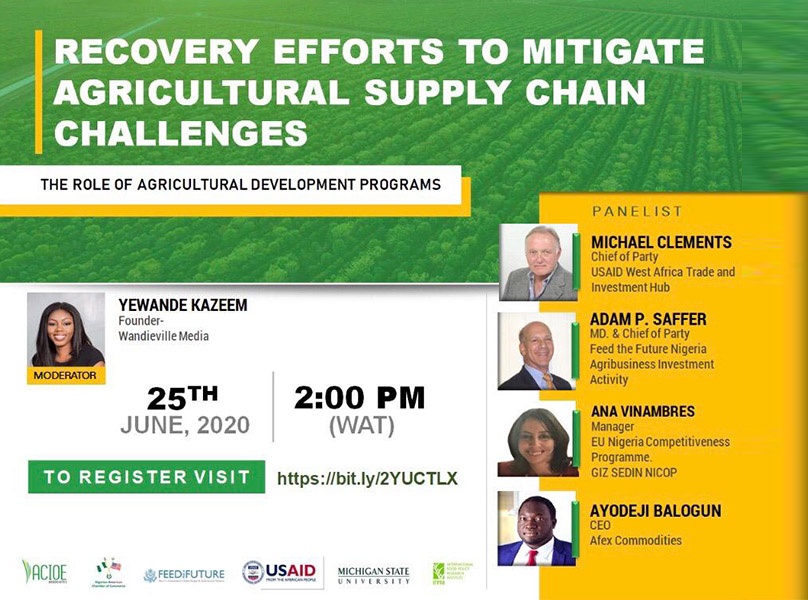
ACIOE Webinar On Recovery Efforts To Mitigate Agricultural Supply Chain Challenges
On Thursday, the 25th of June, ACIOE Associates in partnership with the Nigeria American Chamber of Commerce and the International Food Policy and Research Institute, held the second part of our Agricultural webinar series on Recovery Efforts to Mitigate Agricultural Supply Chain Challenges: The Role of Agricultural Development Programs. The webinar had three main segments, the first segment was a set of presentations, the second segment a panel discussion, and finally a question and answer session.
Mr. Chirnan Barde, the Agribusiness Coordinator at ACIOE Associates started with a presentation that created a background around the partnership with the Nigerian American Chamber of Commerce, and the Nigeria Strategy support program of the International Food Policy Research Institute (IFPRI-NSSP). The presentation also highlighted the ACIOE’s capability, COVID-19 initiatives, and thought leadership activities.
Mr. Matthew Obogbaimhe of the Nigerian American Chamber of Commerce (NACC), set the tone for the presentations and panel discussion with a welcome address to all panelists and a contextual insight into the supply chain challenges faced by NACC members in Nigeria across the agricultural value chain.
The Country Program Leader of IFPRI-NSSP, Dr. Andam Kwaw delivered a presentation on priorities for agricultural development projects. Key findings from IFPRI’s research showed that; no single agricultural value chain is most effective at achieving all preferred outcomes listed by government and agricultural development programs including economic growth, poverty alleviation, and reducing malnutrition. Dr. Knaw also shared that before the pandemic, Nigeria was already facing the triple burden of malnutrition resulting from poor dietary qualities across all income groups and COVID-19 may worsen these problems as such it is important for agricultural development programs to prioritize nutrition in their interventions post the pandemic
Following the presentations was a panel discussion moderated by Ms. Yewande Kazeem, Founder Wandieville Media. The panel consisted of the following distinguished speakers Mr. Michael Clements, Chief of Party, USAID West Africa Trade and Investment Hub; Mr. Ayodeji Balogun, CEO Afex Commodities Exchange ltd; Mrs. Ana Vinambres, Head Projects, EU- Giz Nigeria Competitiveness Program European Union; Dr. Adam P. Saffer, MD & Chief of Party Feed the Future Nigeria Agribusiness Investment Facility; Dr. Abubakar Suleiman, National Program Officer Food and Agricultural Organisation of the United Nations (FAO).
Please see highlights from the panel discussion and Q&A sessions:
Dr. Adam P. Saffer, MD & Chief of Party Feed the Future Nigeria Agribusiness Investment Facility –Dr. Saffer gave an overview of the USAID Feed the Future project in Nigeria. The key details of the project include the following:
- A 5-year project funded by USAID to improve competitiveness and capacity of the agribusiness sector,
- Total funding for the project is 15.7 million dollars
- The timeline for the project is from Dec 2018 to Dec 2023,
- 5 value chains are selected (Maize, Rice, Soybean, Cowpea, and Aquaculture)
- 7 target states are were also selected (Benue, Cross Rivers, Delta, Ebonyi, Kaduna, Kebbi, and Niger states).
- The primary target groups under the project include; Agribusiness (producers, off-takers, processors, aggregators), Agriculture policies (State & federal levels with a strong emphasis on youth and women), and Finance (microfinance banks, commercial banks, government banks).
Challenges highlighted include the following:
- Government policy limitations (Inconsistent policy application, sub-optimal inter-ministerial collaboration, lack of implementation),
- Financial Institutions (Lack of agribusiness know-how, limited use of the secured transactions and moveable assets act 2017, confusing financial markets),
- Producers (Traditional agricultural practices, overly independent farmers, lack of business skills),
- Post-harvest challenges (poor contract farming systems, lack of off-taker commitment, access to finance, local agents take advantage of farmers).
Recovery Efforts identified included:
- Policy reforms (working with state and federal governments on various policy reforms), improving access to finance, agribusiness training, and support.
Dr. Saffer also noted in the Q&A session that the pandemic has exacerbated a lot of things. The main issue being behavioral change, getting people to realize that agriculture is a business, a commercially viable career path for women and youth, and trying to demonstrate that. This requires multi-stakeholder collaboration across multiple levels.
Mr. Michael Clements, USAID West Africa Trade and Investment Hub
He gave an overview of the West Africa and Investment hub activities which includes the following:
- A 5-year program launched in September 2019.
- it’s a social and economic impact investment fund,
- it has a $60 million fund to attract private sector investment, $27 million of the fund is for Nigeria, $16.2 million for catalytic business concepts, and $10.8 million for R&D in Nigeria.
He highlighted the Hub’s COVID-19 response include the following; implanting a COVID-19 grant, grant aimed at mitigating disruption to export-oriented supply challenges. The focus of the grant is on stability and recovery. 220 companies have registered for the grant and 30 companies have completed the application. Applications close on the 30th of June 2020.
He noted that while loans have slowed down, the supply of loans has not. In a survey of over 250 companies, 73% of respondents were not contemplating changes to their overall investment strategies. The timing may change but not the desire. There is no diminution in agricultural stabilization and expansion projects.
Mrs. Ana Vinambres, EU- Giz Nigeria Competitiveness Program (NICOP). European Union – Mrs. Vinambres made a presentation on the NICOP and shared several highlights:
- The projects use a value chain-based system based on innovation and inclusivity.
- The project is targeted at tomato/chili, ginger, leather, and garment value chains.
- The project aims to improve access to finance, improve the technical capacity of smallholder farmers and processors, and improve the policy environment through advocacy, trade information, and M&E policy.
She noted the pandemic’s effects on NICOP implementation included; switching priorities from long term development to immediate health, food crisis, emergency response, and medium-term recovery efforts. NICOP assessed the impact of COVID on selected MSME’s to understand issues and gaps. They developed a specific plan to address these issues and changed implementation timelines and approaches for some activities. Implementation activities started with identifying priorities and existing limitations. Supported access to CBN COVID-19 facilities with a 100% approval rate. Facilitating access to raw inputs and market access. Medium-term measures aimed at financial inclusion, policy mapping, and advocacy, technical support to improve productivity. Long term measures to improve PPP’s, government engagement, donor coordination, and regional partnerships are also part of the program’s response.
Opportunities and Initiatives to promote resilience and sustainability included;
- Investment (more flexible and responsible investment)
- A reinvention of agricultural finance (asset-based finance, off-taker/ processor agreements, insurance),
- Trade (trade policy/ BEE reassessment, recommendations review, streamline trade procedures),
- Value chain integration and Logistics support.
She highlighted in the Q&A session that NICOP is supporting farmers and aggregators to ensure standards and quality do not decrease. NICOP is also working on sensitizing financial institutions on inclusivity and scaling up impact measures
Mr. Ayodeji Balogun, CEO Afex Commodities Exchange Limited.
In his overview, Mr. Balogun highlighted that; Afex has worked with over 110 farmers across 13 states. The role of Afex is to enhance liquidity within the Agricultural sector.Effects of the pandemic on the commodities market include;
- Effect on cold chain component of logistics
- Difficulty accessing fertilizer
- Negative impact on the livelihoods of farmers,
- The threats to food stability going into Q4 of 2020, and Q1 of 2021, noticed an increase in food prices.
In response to the pandemic, Afex has carried out measures which include; providing finance of $7.5million to 50 000 farmers across several value chains, helping processors unlock $30 million to aggregate products, facilitating collaborations with government, donor agencies, and private sector.
As part of the market interventions to mitigate Agricultural supply chain challenges, Mr. Balogun noted that there has to be support for production via last-mile delivery to farmers, structured lines of credit for procurements are needed, lines of credit to support FMCG producers, credit guarantees and insurance have to be bolstered to sustain exports and ensure FOREX.
He also spoke about the need to increase talent in agriculture, with the right human capacity (including producers) while improving the knowledge base of smallholder farmers. There is also the need to increase capital considering demand and supply. Finally, increased productivity. All of these need to be simultaneously orchestrated to yield meaningful change.
Dr. Abubakar Suleiman, National Program Officer Food and Agricultural Organisation of the United Nations (FAO) – The FAO has been supporting the government and people of Nigeria for 40 years, focusing on 5 major areas: food security and nutrition, sustainable management of natural resources, inclusive and gendered value chains/ agribusiness, risk management, and disaster reduction strategies.
He noted the Organization’s COVID-19 response include:
- Ensuring food supply chains are kept alive
- Advocacy to ensure food logistics continue without disruptions through exemptions for food-related logistics
- Advocacy to sustain quality assurance to minimize food safety risks,
- The introduction of interventions to build the resilience of vulnerable groups through social protection of agricultural value chain players.
FAO partnered with WFP and IFAD to conduct a rapid impact assessment to generate an evidence base as a guide to policy formulation and quick interventions on agri-food systems and nutrition. The countrywide assessment report will be released in the first week of July 2020.
Following the panel discussion and Q&A sessions, Ms. Yewande Kazeem thanked everyone and handed over to the ACIOE team. The Managing Partner ACIOE Associates, Mr. Ekenem Isichei gave the vote of thanks and noted that all the information will be shared on to participants.

